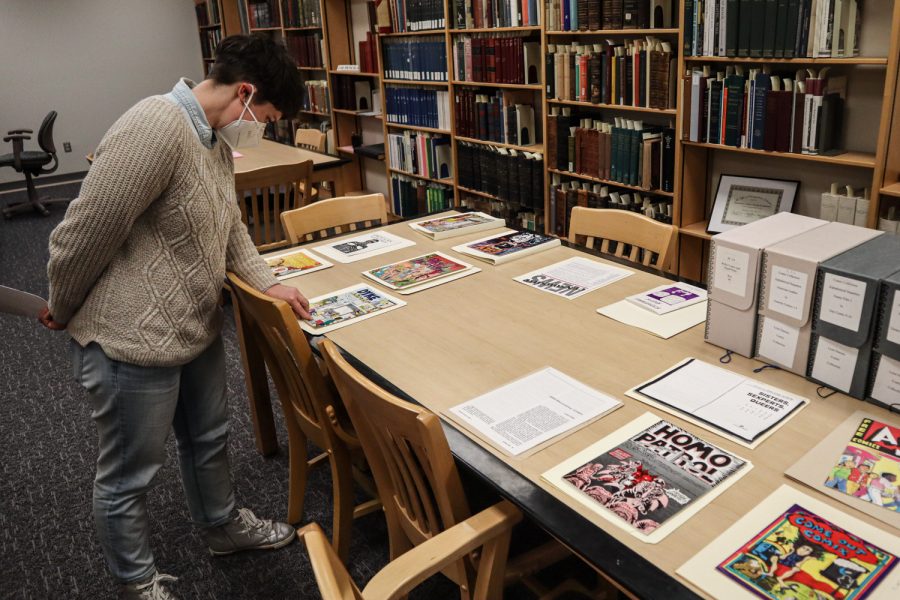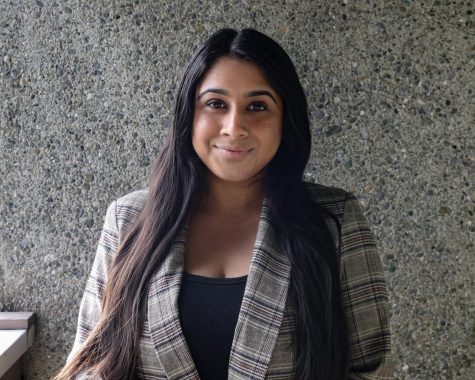Students, faculty discover LGBTQ+ history through library archives
Students gathered in the archives room, read up on queer history
WSU students participating in Terrell Library’s past Queering the Archives event, Oct. 21, 2022.
October 24, 2022
Pages of historical documents, handwritten letters, comics and even a letter from Virginia Woolf to her lover, were some that members of the LGBTQ+ center and volunteers discovered when combing through the Terrell Library archives.
The The Gender Identity/Expression and Sexual Orientation Resource Center and Terrell Library faculty held the Queerying the Archives event on Friday to show students what was discovered in the archives. The purpose of this event was to show students WSU’s and Washington’s queer history through documents and other written materials.
“We probably did [the search] over the span of two months. We were coming to the archives and finding everything. It initially started as me and then I was just inviting students to sign up and help,” said Josie Cohen-Rodriguez, LGBTQ+ Student Life & Community Coordinator.
Cohen-Rodriguez, with the help of the manuscripts librarian Gayle O’Hara, and Lotus Norton-Wisla, the Digital and Community Outreach Archivist and other volunteers, set up the Friday event to show students the discoveries.
There were tables filled with various stacks of documents and materials. On one table there were poems and other works from authors. A letter from Woolf to her lover was there as well with the first line reading, “Books are the quiet monitors of mind.”
“It isn’t really a love letter, it’s just a letter that is kind of gay,” said Al Kurzhal, senior agriculture education major who helped Cohen-Rodriguez with the archives.
Another table had several letters to former Representative Thomas Foley. Many of the letters were written to him from Pullman residents who opposed same-sex relationships and urged him to support bills that would keep queer people from obtaining minority statuses.
One letter from a Pullman resident in 1981 said, “Homosexuals are not a minority,” and continued on making more homophobic remarks.
“This information is important for everyone to see because so much of this shows the history of homophobia in our country and how so many of the same themes and problems that we’re facing now are ones that we’ve been navigating for a long time,” Cohen-Rodriguez said.
She said it is important for people to see the history of WSU and Eastern Washington University where there was hostility and opposition to queer people existing and living their lives.
One table contained over 100 letters of complaints against homosexual minority status from students, parents and student groups. A new rule was proposed at WSU in 1980 where campus organizations would lose their status unless they allowed queer people to have full membership status and take leadership positions.
One letter to the Board of Regents said, “Please for the sake of freedom vote no on the gay rights proposal.”
“I’m disappointed with the fact that a lot of the stuff we have that’s explicitly involved in queer history is very negative towards gay people,” Kurzhal said.
They said they are interested in people’s history and stories that no one writes down.
“It’s not [information] that you have constant access to in the same way you can when you learn about the generals of the wars and stuff like that,” Kurzhal said. “[We] are not gonna learn about the people that were just hanging in a basement together, writing gay radical comics for fun.”
Cohen-Rodriguez said the goal with the archives is to get more people involved with looking for and developing what queer history is and asking questions about that. She wants to gather the materials they find for a research project for next year’s LGBTQ+ month.










